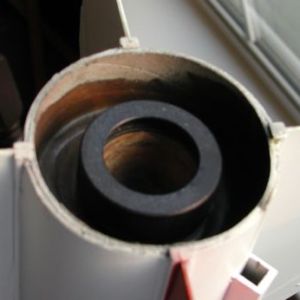
Brief:
Mid-power rocket modified to be a Level 1 Certification Rocket.
Modifications:
The rocket is a strong flier on G motors and is an even better flier on 29mm H motors so it is suitable as a Level 1
Certification Rocket. To modify it to fly on a 29-180 motor, I used an Aeropack 29mm motor retainer designed for
cardboard tubing. When you use this retainer, you need to make certain that you have at least 0.25 inch of motor tubing
sticking out from the rear centering ring so you can JB Weld the retainer onto your tube. As for the motor block inside
the motor mount tube, I would recommend that you discard it all together. If you use single-use 29 mm motors, wrap
several bands of masking tape around the nozzle end of your motor to serve as a motor block similar to the motor block
ring on your 29-180 motor. That way, you can use anything up to 13 inches in length. Replace the flimsy AeroTech chute
with a 30 inch Spherachute and use 15 minute epoxy during your construction and you should be good to go!
Construction:
This is a four-fin rocket that is a semi-scale version of the High Velocity ARCAS sounding rocket round used in the
Sparrow-HV ARCAS rocket of the 1960s. It was the top stage of the two-stage sounding rocket. The tubing is cardboard
and the fins are plastic. The shock cord is the 1/4 inch elastic tubing that AeroTech uses for its mid-power rockets.

The rocket comes in a very sturdy box, and for the most part, you should follow the instructions that come with the kit.
Finishing:
The body tubes have shallow grooves that are easy to fill. Using Krylon paint, I painted it just like the picture on
the box. The plastic fins are tough and easy to finish, so they're a real plus. As for the nose cone, wash it
thoroughly then sand it with 100 grit sandpaper before your first coat of Krylon plastic primer. Use the plastic paint
and primer on the plastic parts and regular Krylon on the cardboard parts and you should have a great looking rocket.
Flight:
This rocket, even after the modification, will fly well on high thrust F motors, G motors, and 29mm H motors. Because
of the AeroTech baffle system, you won't need any wadding.
On August 2003, I achieved my Level 1 Certification at Nike Carrollton Park in Smithfield, Virginia, with this rocket on an Aerotech H165 Redline motor. The lift off was fast and the rocket flew, as always, straight as an arrow.
Recovery:
The chute ejected at apogee and the rocket spiraled down slowly and softly on the 30 inch Spherachute a hundred yards
or so from the launch point for the successful conclusion of my certification flight.
Summary:
PROs: Easy to construct, good-looking, big rocket for Level 1 Certification. Great every-day flier.
CONs: None to speak of.
This is an excellent mid-power rocket that is made even more versatile by these modifications to be a great Level 1 rocket.
Other Reviews
- Aerotech HV ARCAS By Chris Raymond (September 21, 2007)
Large single stage rocket which is a replica of the high-velocity version of the Arcas sounding rocket. The HV Arcas came in a sturdy box . All the parts where there when it arrived. The instructions were easy to follow and had a lot of illustrations. The parts all fit and if assembled right is very study. No special tools were needed. Finishing: I painted it like the box . It was easy to ...
- Aerotech HV ARCAS By John Yurcina (August 21, 2007)
A great scale model of the HV ARCAS sounding rocket. Nothing more to say! This kit came with two body tubes, four fins, three centering rings made of "aerofibre" material, and a large hollow plastic nose cone. The instructions that came with this kit were *very* easy to follow.... Everything fit into place as planned, I had no problems. I used 30-minute epoxy and medium CA ...
 |
 |
Flights
Sponsored Ads
 |
 |












